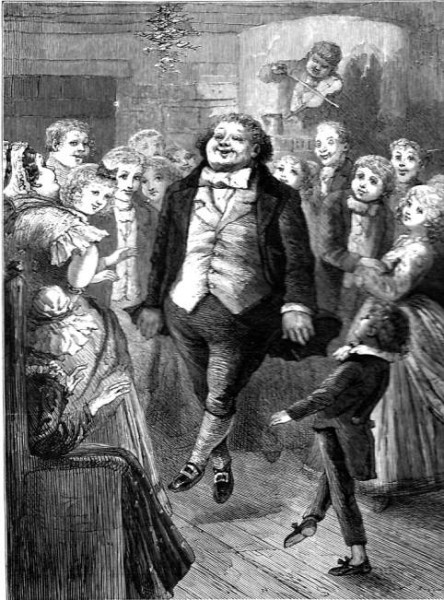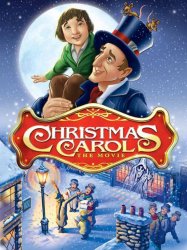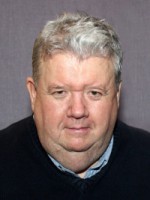Mr. Fezziwig

- Infos
- Photos
- Best films
If you like this character, let us know!
Mr. Fezziwig is a character from the novel A Christmas Carol created by Charles Dickens to provide contrast with Ebenezer Scrooge's attitudes towards business ethics. Scrooge, who apprenticed under Fezziwig, is the very antithesis of the person he worked for as a young man. Mr. Fezziwig is portrayed as a happy, foppish man with a large Welsh wig. In Act I, Scene 5 of A Christmas Carol, the Ghost of Christmas Past takes Scrooge to revisit his youthful days in Fezziwig's world located at the cusp of the Industrial Revolution. Dickens used Fezziwig to represent a set of communal values and a way of life which was quickly being swept away in the economic turmoil of the early nineteenth century.Scrooge is reminded how his own values have diverged greatly from those of someone he once admired. Fezziwig is also a capitalist, but he moderates profit maximization with kindness, generosity, and affection for his employees. Fezziwig cannot go too far in ignoring profitability—if his products cost too much he will be out competed. If his margins are too low, he will be unable to secure loans to continue operations. In the early 19th century such small owner-controlled traders were being swept up. In the 1951 screenplay for the movie Scrooge by Noel Langley, Fezziwig is advised to bend with the times and sell out, but Fezziwig resists this call to progress:
Jorkin: "Mr. Fezziwig, we’re good friends besides good men of business. We’re men of vision and progress. Why don’t you sell out while the going’s good? You’ll never get a better offer. It’s the age of the machine, and the factory, and the vested interests. We small traders are ancient history, Mr. Fezziwig.”
Fezziwig: “It’s not just for money alone that one spends a lifetime building up a business…. It’s to preserve a way of life that one knew and loved. No, I can’t see my way to selling out to the new vested interests, Mr. Jorkin. I’ll have to be loyal to the old ways and die out with them if needs must.”
In the end, Jorkin hires away Scrooge and buys out Fezziwig's business, moving it from private to shareholder ownership. As agent of shareholder interests, Jorkin and his managers Scrooge and Marley are constrained from diverging from the goals of profitability, making it more difficult to be a Fezziwig even if they were inclined to. Fezziwig's successor Jorkin demonstrates the weakness of self-interest when he announces to the Board of directors that the company is insolvent after years of embezzling. Scrooge and Marley demonstrate their cunning self-interest by using the crisis to attain controlling interest in the company. In Langley's and director Brian Desmond Hurst's Scrooge, these new managers replacing the Fezziwigs are predatory towards shareholders and employees alike, the product of a process and a mindset that Dickens felt was at odds with humanity itself.
In A Christmas Carol starring Kelsey Grammer, Fezziwig, following a downturn in his business, comes to Scrooge for a business loan. Scrooge, starting to turn into his greedy self, refuses the request, stating that he (Scrooge) would be throwing good money after bad.
Best films
Played by the actors
Filmography of Mr. Fezziwig (6 films)

A Christmas Carol (2009)
, 1h36Directed by Robert Zemeckis
Origin USA
Genres Drama, Science fiction, Fantastic, Comedy, Comedy-drama, Fantasy, Adventure, Horror, Animation
Themes Christmas films, Time travel films, Ghost films, Children's films
Actors Jim Carrey, Gary Oldman, Cary Elwes, Steve Valentine, Sammi Hanratty, Colin Firth
Rating68%





In 1843, Ebenezer Scrooge, a bitter and miserly old moneylender at a London counting house holds everything that embodies the joys and spirit of Christmas in contempt. He refuses to visit his cheerful nephew, Fred, at his Christmas dinner party with his family, and he forces his underpaid employee Bob Cratchit to beg to take the day off for his own family. On Christmas Eve, Scrooge is visited by the ghost of his former business partner Jacob Marley, who had died seven years prior and is now forced to spend his afterlife carrying heavy chains forged from his own greedy ways. Marley warns Scrooge that he will suffer an even worse fate if he does not repent. He then tells Scrooge he will be visited by three more spirits that will help guide him.

A Christmas Carol (2004)
, 1h37Directed by Arthur Allan Seidelman
Genres Drama, Musical theatre, Musical
Themes Christmas films, Time travel films, Ghost films, Musical films
Actors Kelsey Grammer, Jesse L. Martin, Jane Krakowski, Jennifer Love Hewitt, Geraldine Chaplin, Jason Alexander
Rating62%





The film opens at the London Exchange on Christmas Eve in 1843 where everybody is looking forward to Christmas Day except for the crabby and greedy miser Ebenezer Scrooge. Scrooge who hates Christmas shows his cold attitude to others by refusing to show mercy to a father and his daughter who are in debt, supporting the prisons and workhouses for the poor and refusing to dine with his nephew Fred. That night though as Scrooge dines alone before going to bed the ghost of his seven-year dead partner Jacob Marley appears. He tells Scrooge to repent or suffer the same as him by wearing a chain as Marley wears the one he forged from his own greed. Other ghosts also haunt Scrooge who too wear chains implying they were selfish and cold-hearted when they were alive. Marley tells Scrooge he will be haunted by three spirits and the first will call at One.

Christmas Carol: The Movie (2001)
, 1h17Directed by Jimmy T. Murakami
Origin United-kingdom
Genres Drama, Animation
Themes Christmas films, Time travel films, Ghost films
Actors Simon Callow, Kate Winslet, Nicolas Cage, Jane Horrocks, Rhys Ifans, Michael Gambon
Rating53%





En 1857, à Boston, le vieil avare Ebenezer Scrooge, se retrouve seul le soir de Noël. L'esprit de Noël va alors lui montrer tout le mal qu'il a fait autour de lui.

A Christmas Carol (1999)
, 1h35Directed by David Hugh Jones
Origin USA
Genres Drama, Fantastic, Fantasy
Themes Christmas films, Time travel films, Ghost films
Actors Patrick Stewart, Richard E. Grant, Joel Grey, Ian McNeice, Saskia Reeves, Kenny Doughty
Rating73%





In a prologue, Ebenezer Scrooge (Patrick Stewart) buries his business partner, Jacob Marley, in a rural churchyard. The funeral is poorly attended.

A Christmas Carol (1984)
, 1h40Directed by Clive Donner
Genres Drama, Science fiction, Comedy, Fantasy
Themes Christmas films, Time travel films, Ghost films
Actors George C. Scott, Frank Finlay, David Warner, Susannah York, Angela Pleasence, Edward Woodward
Rating77%





The film opens with a funeral procession, presumably that of Jacob Marley, as his death is mentioned by the narrator (Roger Rees). The scene then changes to seven years later, on Christmas Eve in 1843 within the business establishment of Scrooge and Marley. Bob Cratchit (David Warner), a clerk employed by Scrooge, comments that Marley has been dead for seven years, but is gruffly ordered to return to work by Marley's surviving partner, Ebenezer Scrooge (George C. Scott). Bob then attempts to add some coal to an almost nonexistent fire, but is stopped by Scrooge, who gives him a curt and cutting lecture on clothing as protection against the cold, and that "coal burns; coal is fleeting, and coal is costly". Scrooge then declares that there will be no more coal burned in the office that day, and orders Cratchit to return to work lest he be fired.

A Christmas Carol (1971)
, 25minutesDirected by Richard Williams
Origin USA
Genres Drama, Fantasy, Animation
Themes Christmas films, Time travel films, Ghost films
Actors Alastair Sim, Michael Hordern, Melvyn Hayes, Joan Sims, Michael Redgrave, Diana Quick
Rating75%





 Connection
Connection



